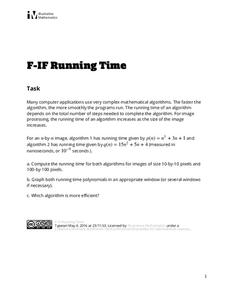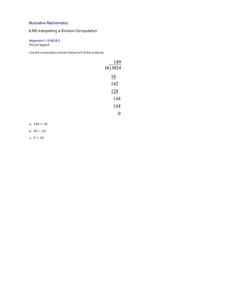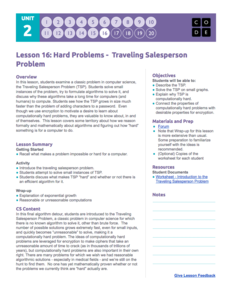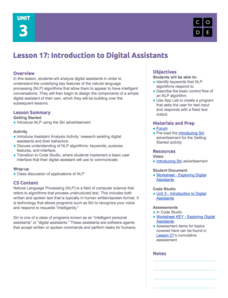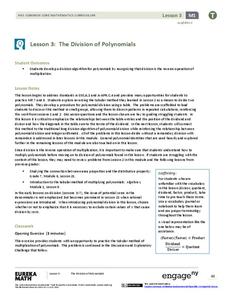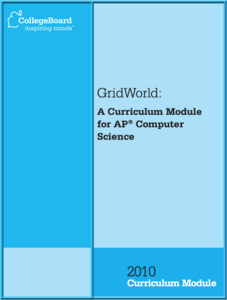EngageNY
The Euclidean Algorithm as an Application of the Long Division Algorithm
Individuals learn to apply the Euclidean algorithm to find the greatest common factor of two numbers. Additionally, the lesson connects greatest common factor to the largest square that can be drawn in a rectangle.
EngageNY
Dividing Multi-Digit Numbers Using the Algorithm
Scholars learn to divide multi-digit numbers using the standard algorithm in the 14th installment in a module of 21 parts. They get plenty of practice with the algorithm by completing a worksheet.
EngageNY
The Division Algorithm—Converting Decimal Division into Whole Number Division Using Fractions
Knowing the standard algorithm opens up a whole new world of division. Scholars learn how to convert division involving decimals to division involving whole numbers to use the standard algorithm. Knowing how to multiply with powers of...
EngageNY
The Long Division Algorithm
Two methods are always better than one! The eighth installment in this series asks pupils to convert decimals to fractions using two approaches. Individuals first use the more traditional approach of long division and then use reverse...
Illustrative Mathematics
Running Time
Ever wonder why that computer image takes so long to load? Well, math is involved and provides the algorithms needed to compute the measure in nanoseconds. Young mathematicians plug the image measures into the formulas and compare the...
EngageNY
Comparing Methods—Long Division, Again?
Remember long division from fifth grade? Use the same algorithm to divide polynomials. Learners develop a strategy for dividing polynomials using what they remember from dividing whole numbers.
Virginia Department of Education
Integers: Addition and Subtraction
Young mathematicians construct their own understanding of integers with an inquiry-based math lesson. Using colored chips to represent positive and negative numbers, children model a series of addition and subtraction problems as...
EngageNY
The Division Algorithm—Converting Decimal Division into Whole Number Division Using Mental Math
Make math much simpler with mental math methods. The 16th installment in a series of 21 looks at ways scholars can apply mental math to convert division problems into easier problems with the same quotient. Multiplying or dividing both...
Illustrative Mathematics
Interpreting a Division Computation
Mathematicians show their understanding of a division problem. If a student can apply long division to a pair of numbers and determine a quotient, what other factors and multiples become apparent? The example illustrates a simple...
Code.org
Hard Problems – Traveling Salesperson Problem
Even computers find this to be a hard problem. In the eighth installment of a 12-part unit, young computer scientists learn about the traveling salesperson problem. They formulate algorithms to solve the problem and find out why it is...
Code.org
Introduction to Digital Assistant Project
How does a computer recognize voice commands? Scholars learn about digital assistants and natural language processing (NLP) algorithms in the ninth instructional activity of the series. They begin building a simple digital assistant and...
Scholastic
Study Jams! Addition with Regrouping
Zoe needs to back up her music collection, but do her friends have enough space on their computers to help? Find out as you teach your class how to add two- and three-digit numbers with regrouping. Place value is emphasized as both the...
Curated OER
Multiplication & Division Word Problems
Show your class all the hard work you have put into their lesson by showing this PowerPoint presentation. They will not only be proud of you, but it will help them solve multiplication and division word problems using the algorithms.
EngageNY
The Division of Polynomials
Build a true understanding of division of polynomials. Learners use their knowledge of multiplying polynomials to create an algorithm to divide polynomials. The area model of multiplication becomes the reverse tabular method of division.
West Contra Costa Unified School District
Polynomial Division
How do you apply the traditional division algorithm to polynomials? Here is an Algebra II lesson that extends the use of the division algorithm to polynomials. After establishing the concept of long division, synthetic division and the...
Center for Mathematics and Technology
Whole Numbers: Using an Area Model to Explain Multiplication
There are many ways to work through a multiplication problem. Using an area model, kids complete several worksheets with different types of multiplication problems, including multiplying by ten, and explain how the new strategies differ...
Scholastic
Study Jams! Single-Digit Division
Learning the algorithm for long division is no easy task, but this resource helps to break the process into manageable steps. Beginning with an explanation of basic division vocabulary, this presentation goes on to model long division...
EngageNY
Grade 5 Math Module 1, Topic F, Lesson 14
Be sure to place value on place value understanding. Young mathematicians learn to divide decimals by whole numbers when compatible numbers are not available. They use place value discs in place value charts, then connect this strategy...
Code.org
Processing Arrays
Scholars use a playing card activity to help them develop a program to find the minimum value of a list. They learn to use for loops to write code that will process lists.
TryEngineering
Search Engines
Learn how to find things quickly and efficiently on the Internet. The instructional activity teaches how search engines work and how to efficiently use them. It includes an activity where groups develop search queries to find sites using...
Curated OER
Rational Number Project
Infuse your unit on fractions, decimals, and operations with a thorough module about rational numbers. With a teaching guide, learner examples, templates for instruction, and lesson rationale, the module is a solid way to...
College Board
Strategies for Teaching AP Computer Science
Implement strategies from the beginning to the end. A collection of strategies and lessons span from the first day of school to after the exam. Resources cover basic information such as computer ethics and top 10 tips to a lesson on how...
College Board
GridWorld: A Curriculum Module for Computer Science
Stretch out the grid. Teaching modules provide suggestions on how to use the case study, GridWorld, throughout the year as opposed to only right before the exam. The instructional units provide suggestions for presentations, assignments,...
Curated OER
Multiplication & Division
Helpful for building a multiplication unit that focuses on different strategies. With explanations about repeated addition and subtraction as foundations for multiplication, scaling, summaries of progression, and basic multiplication and...
Other popular searches
- Numerical Algorithms
- Multiplication Algorithms
- Addition With Algorithms
- Addition Algorithms
- Subtraction Algorithms
- Math With Algorithms
- Algorithms in Everyday Math
- Algebra Algorithms
- Algorithms Rectangular Prism
- Parallel Algorithms
- Multistep Algorithms
- Algorithms Bisection




